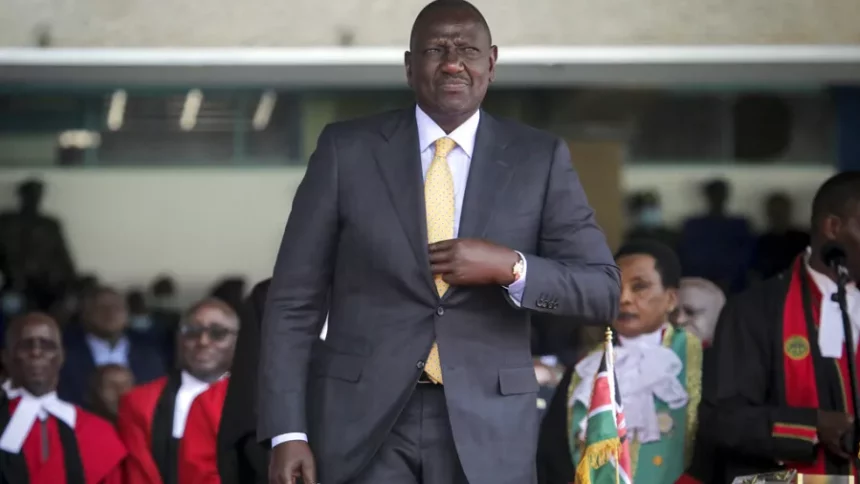Currently, there are just over 12 million e-Citizen users. The number is expected to grow once all government services are fully and exclusively available on e-Citizen.
President William Ruto looks to collect at least Sh1.5 trillion paid for government services through e-Citizen, even as the digital platform faces a third challenge in court since its inception in 2014.
Since onboarding an additional 9,000 services to the platform, revenue collection through the e-Citizen platform has grown tenfold, and officials monitoring it project that the government could collect over Sh1.5 trillion each financial year.
Director-General of e-Citizen services Ambassador Isaac Ochieng and Head of Government Digital Payments Silas Oswe said that current projections indicate the government will collect at least Sh1.3 trillion at the end of the 2023/2024 financial year.
Official data seen by the Nation shows that since the addition of 14,000 services onto the e-Citizen platform, government has pushed revenue collection from Sh50 million each day to over Sh600 million in the same period – an increase of over 1,200 per cent.
Mr Ochieng and Mr Oswe said that some of the biggest revenue generators will be the Lands, Health and the Interior ministries.
The duo projects that the Lands ministry can collect up to Sh600 billion each financial year once payment for all services is exclusively through e-Citizen.
Last month, when Lands PS Nixon Korir appeared before the National Assembly, he argued that the planned increase of some costs is expected to rake in at least Sh100 billion each financial year.
The duo is confident of the project, even as Kilifi Senator Stewart Madzayo takes on the government over the Sh50 convenience fee charged for each service offered on e-Citizen.
Interestingly, Busia Senator Okiya Omtatah has also challenged the government in court over e-Citizen.
Mr Omtatah’s suit seeks a declaration that the government illegally single sourced payment solutions providers and financial institutions. He also wants the government compelled to make full disclosures on the amounts collected through e-Citizen since its inception in 2014.
The Busia Senator has also challenged the Sh50 convenience fee, and wants Pesaflow, the current revenue management agent, and other private firms locked out of any process that would see them collect service seekers’ private data.
Mr Omtatah’s case is also pending determination.
Mr Ochieng and Mr Oswe argue that income from the e-Citizen platform, coupled with revenue collected by the taxman, could see Kenya garner enough for her budget and limit the need for aid and loans.
Currently, there are just over 12 million e-Citizen users. The number is expected to grow once all government services are fully and exclusively available on e-Citizen.
Aside from revenue collection, the bureaucrats maintained that onboarding all government services on e-Citizen is intended to bring in convenience for seekers, especially those who live and work far from the capital.
“Once I met an individual at my office. He had travelled all the way from Moyale to register a business name, a service that costs Sh800. He spent five days in Nairobi, paying Sh2,000-a-night in a hotel. Together with transport and meals, he spent nearly Sh35,000 and lost time he would have spent doing other constructive things in Moyale. With the onboarding of services, we are now saying “do these things over there, you don’t have to come here (Nairobi),” Mr Oswe said.
In five months, the State Department for Mining Services has already collected more than it did in the entire financial year ending June, 2023. The department has collected Sh6.5 million.
In the financial year ending June, 2023 the same department collected only Sh340,000 through e-Citizen.
The Kenya Wildlife Service (KWS) is now averaging Sh85 million in monthly revenue, up from Sh5 million, the data indicates.Kenyans seek services at a Huduma centre.
The Ministry of Health and the State Department for Immigration have also registered significant revenue growth since placing their services in the e-Citizen platform.
Mr Ochieng added that the government projects collection to hit at least Sh1.5 trillion each financial year, once all services are available on e-Citizen and processes have been streamlined.
“What government is trying to achieve is payment and delivery of service to be done on the spot. Revenue is being collected transparently, and you can see it real time. Previously, the Treasury had to wait for the Kenya Revenue Authority to give figures on revenue collection,” Mr Ochieng said.
The Kenya Kwanza government’s push for a fully digital service provision process is being driven by three ministries – Interior, ICT and the National Treasury.
At the Interior ministry, CS Kithure Kindiki and PS Julius Bitok arein charge of the digital migration, with Mr Ochieng under them.
CS Njuguna Ndung’u and PS Chris Kiptoo are leading the team from the Treasury, with Mr Oswe working under them. They ensure revenue collection and account for every cent paid by service seekers.
At the ICT ministry, CS Eliud Owalo and PS John Tanui have been tasked with ensuring that the technology to support e-Citizen is up and running.
Mr Ochieng added that human-to-human contact will be significantly reduced, which will in turn cut down the risk of corruption, but that several jobs will be created.
“The government has partnered with private sector players like telcos and financial institutions. Provision of these services is expected to create at least 600,000 jobs for effective service delivery. For instance, we have galvanised techies from both public and private sectors,” Mr Ochieng said.
Mr Oswe said that some State agencies were completely analogue, but Head of Public Service Felix Koskei and secretary to the Cabinet Mercy Wanjau have helped ensure that most services are brought onto the e-Citizen platform.
One of the new features that the e-Citizen project is expected to roll out soon is notifying users of payment due dates when their documents are nearing expiry, for instance with driving licences and land rates.
“Service seekers will get reminders, like with driving licenses and land leases, which might curb graft. For instance with expiring land leases,” Mr Oswe added.
Mr Ochieng and Mr Oswe said that a suit filed by the previous revenue management agent, Goldrock Capital Ltd, has been settled out of court.
Goldrock Capital sued the National Treasury and e-Citizen’s developer, Webmasters Kenya and its sister company Webmasters Africa after a fight broke out over the convenience fee.
Webmasters had illegally brought Goldrock Capital onboard the project as a revenue management agent. Goldrock was to pocket the convenience fee as its payment for the services offered.
But in 2017 the National Treasury locked Goldrock Capital out, after it emerged that the firm was illegally appointed as an agent.
There was no gazette notice allowing Goldrock Capital to collect or manage funds on behalf of government.
At the time Goldrock Capital sued, Sh127 million in convenience fees held in M-pesa was frozen by the court.
Mr Omtatah’s suit was merged with Goldrock Capital’s case in 2018.
But in December, 2022 Goldrock Capital, the Webmasters firms and the National Treasury told the court that they were engaged in out-of-court talks.
The court allowed Mr Omtatah to divorce his suit from the court file, amend it and present it independently before the constitutional and human rights division of the High Court.
Early this year the Goldrock case against Webmasters and the National Treasury was withdrawn following an out-of-court settlement.
This now leaves the cases filed by Mr Omtatah and Mr Madzayo pending.



